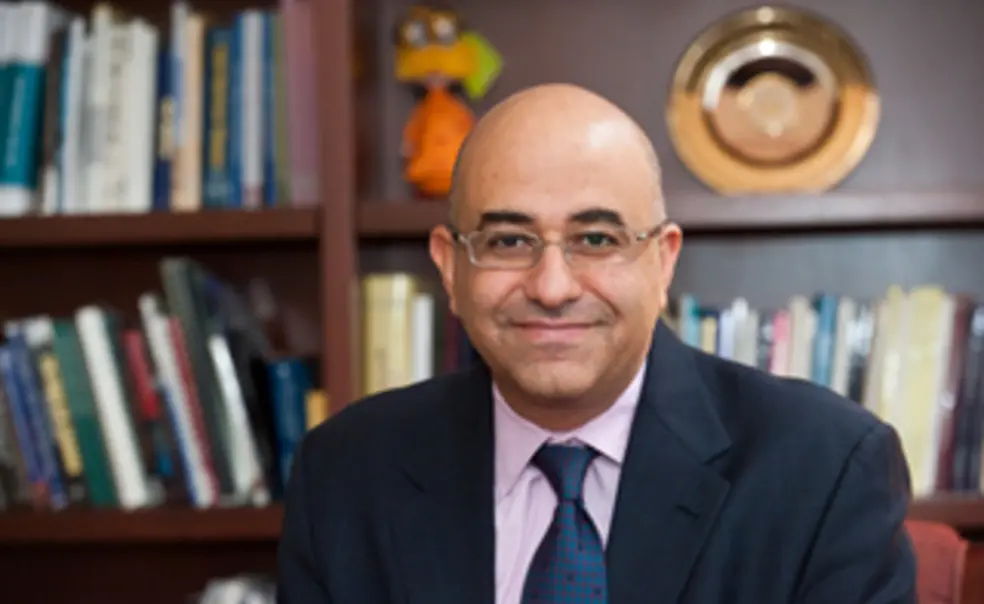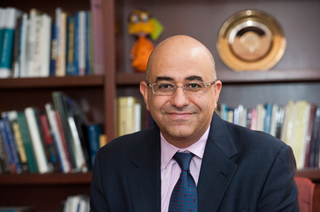Shehata *00: In Egypt, representation, participation are keys to stability
Samer Shehata *00
(This is a corrected version of an earlier post. The correction appears at the end of the story.)
Samer Shehata *00 is an assistant professor of Arab politics at Georgetown University’s Edmund A. Walsh School of Foreign Service. The author of Shop Floor Culture and Politics in Egypt (SUNY Press 2009) and numerous articles, Shehata has tried to explain the recent uprisings in Egypt and across the Middle East in forums as diverse as Foreign Policy magazine and The Colbert Report. This week, he spoke with PAW senior writer Mark F. Bernstein ’83.
What does the uprising in Egypt mean for the United States?
It is still not entirely clear. Egypt has been very important for the United States. It has a peace treaty with Israel and has played an active role, not only in negotiations between Israel and the Palestinians, but in mediating conflicts between Palestinian groups. It is also important in the so-called war on terror. We don’t know what will happen next because we don’t yet know what sort of government will take shape in Egypt. Although I don’t think the revolution jeopardizes American interests, it will make the relationship more complicated and require more negotiation by the United States to secure the things it has taken for granted in the past.
Should the United States be concerned about the role of the Muslim Brotherhood in Egyptian politics?
They are a well-established, organic, and legitimate player in the Egyptian political scene. Their history goes back even before the Egyptian Republic was established in 1952. I don’t believe that they are a threat to a democratic Egypt. Since the 1970s, they have been a peaceful political organization that has regularly participated in elections and provided social services. In fact, they were a primary victim of the old regime’s repression. There are some elements of their ideology that are illiberal, relating to full political rights for women and religious minorities. Those are issues of concern, but they can be overcome. But the Muslim Brotherhood are not clerics, they do not believe in a theocratic state. They are middle-class professionals.
What should American policy be toward Egypt?
It is important for the United States to evaluate what its policies have been historically before moving to specific policy recommendations. Unfortunately, our policy toward the Middle East over the last 50 or more years has been to support authoritarian regimes. Clearly that has been a bad policy, both strategically and for reasons of principle. The stability we thought that those regimes provided is illusory. Real stability can only be achieved through representative institutions and political participation.
In the short term, there are a number of things we can do. The Egyptian economy has suffered tremendous losses. It would be beneficial if the United States and other Western countries offered immediate economic assistance to help Egypt get through this period. We should also support principles, such as free elections and human rights, as opposed to trying to choose sides between competing groups.
Over the last several months, there have been political uprisings in many countries across the Middle East. Are these revolutions related, and are we witnessing a real shift in the broader Arab political outlook?
Yes and yes. There’s no question that the Tunisian revolution showed the Arab world that peaceful protest against an autocratic regime could lead to political change. Of all the regimes in the Arab world, the regime of Zine El Abidine Ben Ali in Tunisia came closest to being a police state. For Tunisians to be able to oust him after a little more than three weeks of peaceful protests was incredibly empowering for Egyptians and others. It showed that what was previously thought impossible was actually quite realizable. People forget that the Arab world is a region. There are very important historical, cultural, linguistic, and political ties between these countries. What happens in Tunis matters in Cairo. What happens in Gaza is important for people in Rabat. That helps to explain why there has been this spillover effect.
Interview has been condensed.
For the record
An earlier version of this post omitted two words in Shehata’s responses: “so-called” in his mention of the war on terror, and “thought” in the phrase “previously thought impossible.”













No responses yet